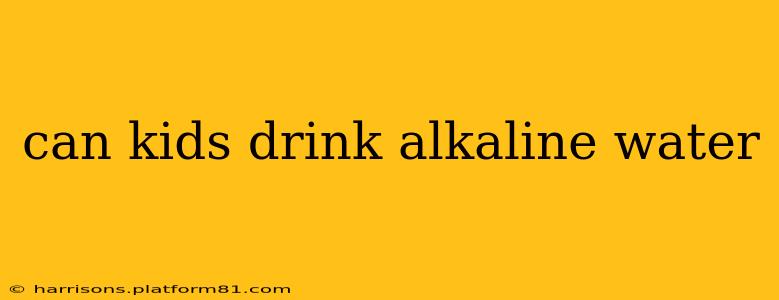Can Kids Drink Alkaline Water? A Parent's Guide
The question of whether kids can drink alkaline water is a common one among health-conscious parents. While alkaline water has gained popularity for its purported health benefits, the evidence supporting these claims, especially in children, is limited. This article will explore the topic, addressing common concerns and providing a balanced perspective.
What is Alkaline Water?
Before diving into whether kids should drink it, let's understand what alkaline water is. Regular tap or bottled water has a pH level around 7, considered neutral. Alkaline water, on the other hand, has a higher pH level, typically between 8 and 9. This higher pH is achieved through various methods, such as adding minerals like calcium, magnesium, or potassium. Proponents claim these added minerals and the higher pH offer several health benefits.
Potential Benefits (with caveats):
Some suggest alkaline water may help with:
- Improved hydration: The added minerals might enhance hydration, though more research is needed to confirm this in children.
- Better digestion: Some believe it can help neutralize stomach acid, potentially aiding digestion. However, this is not conclusively proven, and altering stomach acid levels can be detrimental.
- Reduced inflammation: This is another claimed benefit, yet scientific evidence specifically in children is lacking.
Potential Risks and Concerns:
While generally considered safe, several concerns surround alkaline water consumption, especially for kids:
- Mineral imbalance: Excessive consumption of minerals like calcium and magnesium can lead to an imbalance in the body, potentially affecting other nutrient absorption. Children's bodies are still developing, making them more vulnerable to such imbalances.
- Altered stomach pH: The alkaline nature of the water might neutralize stomach acid, potentially hindering the body's ability to kill harmful bacteria and aid digestion. This is particularly concerning in children whose digestive systems are still maturing.
- Lack of conclusive scientific evidence: Most of the claimed benefits of alkaline water lack strong scientific backing, particularly in pediatric populations. More research is needed to understand the long-term effects on children's health.
- Potential for mineral buildup: While minerals are essential, excessive intake from alkaline water can lead to mineral buildup in the body, particularly in children with pre-existing conditions.
H2: What are the risks of giving alkaline water to children?
The main risks involve potential mineral imbalances due to excessive intake, disruption of the stomach's natural acidity which plays a crucial role in digestion and immunity, and the lack of definitive scientific proof regarding benefits in children. It's crucial to remember that a balanced diet, adequate hydration with regular water, and a healthy lifestyle are more significant contributors to children's well-being than alkaline water.
H2: Is alkaline water better than regular water for kids?
There is no conclusive scientific evidence to suggest alkaline water is superior to regular water for children. Regular water is perfectly adequate for hydration and fulfills the body's fluid needs. The added minerals in alkaline water aren't necessarily beneficial and may even be harmful in excess.
H2: What is the best water for kids to drink?
The best water for kids is clean, fresh, and safe drinking water. This could be filtered tap water or bottled water, ensuring it meets appropriate safety standards.
H2: Can alkaline water cause stomach problems in children?
While not universally true, it's possible. Altering the natural acidity of the stomach can potentially disrupt digestion and lead to discomfort. This is especially concerning in children whose digestive systems are still developing.
Conclusion:
While alkaline water is unlikely to cause immediate harm, there's no compelling evidence to support its superiority over regular water for children. Parents should prioritize providing children with clean, safe, and adequately filtered water to ensure proper hydration and overall well-being. Focus on a balanced diet and a healthy lifestyle instead of relying on potentially unproven benefits of alkaline water. If you have specific concerns about your child's hydration or dietary needs, consult a pediatrician or registered dietitian for personalized advice. They can assess your child's individual requirements and help make informed decisions about their hydration and overall health.
